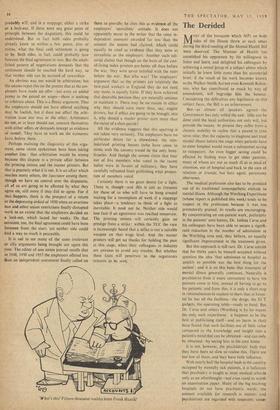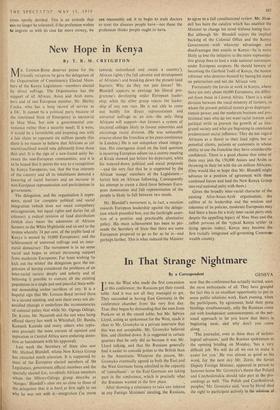The Derided
mogr of the bouquets which MPs on both sides of the House threw at each other during the third reading of the Mental Health Bill were deserved. The Minister of Health has astonished his opponents by his willingness to listen and learn, and delighted his colleagues by achieving a sound 'grasp of a subject about which initially he knew little more than his ministerial brief; if the result of his work becomes known as the Walker-Smith Act not even Kenneth Robin- son, who has contributed so much by way of amendment, will begrudge him the honour. Considering the difficulties any legislation on this subject faces, the Bill is an achievement.
But—as almost all speakers agreed—the Government has only willed the end : little can be done until the local authorities not only will, but provide the means. At present they suffer from a chronic inability to realise that a pound in time saves nine; that the capacity to diagnose and treat mental illness before the stage when patients have to enter hospital would mean a substantial saving to ratepayers. An even bigger saving could be effected by finding ways to get older patients, many of whom are not so much ill as in need of attention, out of hospital and back to the care of relatives or friends; but here again, parsimony intervenes.
The medical profession also has to be prodded out of its traditional unsympathetic attitude to mental illness. Although the Worthing Experiment (whose report is published this week) tends to be suspect in the profession because it was too prematurely praised, its results are encouraging. By concentrating on out-patient work, preferably in the patients' own homes, Dr. Joshua Carse and his colleagues have been able to secure a signifi- cant reduction in the number of admissions in the Worthing area and, they believe, an equally significant improvement in the treatment given.
But this approach is still rare. Dr. Carse admits that for thirty years he himself accepted without question the idea 'that admission to hospital as quickly as possible was the best thing for the patient'; and it is on this basis that treatment of mental illness generally continues. Naturally a psychiatrist finds it more convenient to have his patients come to him, instead of having to go to his patients; and from this, it is only a short step in rationalisation to explain to them that in hospi- tal he has all the facilities—the drugs, the ECT gadgets, the operating table—ready to hand. But Dr. Carse and others (Worthing is by no means the only such experiment : it happens to he the best at publicising itself--and no harm in that) have found that such facilities are of little value compared to the knowledge and insight into a patient's mind that can be obtained- - and can only be obtained—by seeing him in his own home.
It is not, however, the psychiatrists' fault that they have been so slow to realise this. Thcrc are too few of them, and they have little influence.
With nearly half the hospital beds in the country occupied by mentally sick patients, it is ludicrous that psychiatry is taught at most medical schools only as an afterthought—not even rated as worth an examination paper. Many of the big teaching hospitals do not have psychiatric wards: the amount available for research is minute:' and psychiatrists are regarded with suspicion; some-
times openly derided. This is an attitude that can no longer be tolerated; if the profession wishes to impress us with its case for more money, we can reasonably ask it to begin to train doctors to treat the diseases people have—not those the profession thinks people ought to have.



































 Previous page
Previous page